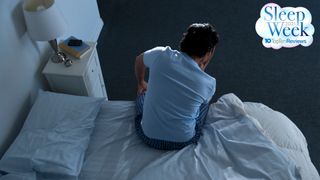Getting up to use the bathroom when you should be sleeping is something that affects most adults, with the definition of nocturia being “if you wake up more than one time each night to go to the bathroom”. According to the Urology Care Foundation (opens in new tab), nocturia affects one in three US adults over the age of 30.
Why do we wake up to pee in the middle of the night?
There are several reasons. Some are easy to explain, such as drinking too much before bedtime, and forgetting to pee before you go to bed. But if you find yourself frequently getting up to visit the bathroom in the small hours, then you should check in with your doctor as it could be a sign of an underlying health condition such as diabetes or heart disease. Other reasons why you may experience nocturia include stress and reduced bladder capacity as well as a natural part of ageing, with many more nightly trips to the bathroom occurring for the over-60s. And while that’s true, Harris M. Nagler, MD, President of the Urology Care Foundation says, “Many patients who wake up at night to urinate believe it is a normal part of aging. Urinating at night is called nocturia. “Although there are changes that occur with aging, it is important to consult with a Urologist to find the reasons for your nocturia, treat the causes and improve daily life.”
What the experts say about how to deal with nocturia
So, what can be done about having to pee in the middle of the night? Urologist Emily Slopnick, MD at the Cleveland Clinic (opens in new tab), recommends limiting your intake of fluids two hours before bedtime, as well as keeping your alcohol and caffeine intake to a minimum in the hours before bedtime, as both these can stimulate the bladder. The Urology Care Foundation has also shared the following as possible solutions that may help you:
Limit fluid intake at night. Drink plenty of fluids during the day but limit fluids 2-4 hours before going to bed. Limit caffeine and alcohol.Manage your use of diuretics. If you must take a diuretic, take these 6 or more hours before sleep. This will help reduce the number of times you urinate at night.Raise your legs or use compression socks. If you have fluid build-up in your legs, it helps to raise them. Using elastic compression stockings may help.Enjoy afternoon naps. When you sleep poorly, a nap can be welcome. Naps can also allow liquids to flow into the bloodstream. However, be careful not to nap too much or you will lower your Sleep Drive (your need for sleep) in the evening.
Also be aware that certain medications, such as those for blood pressure or heart disease, can have a diuretic effect meaning you will be more likely to wake up to pee in the night. If this is the case, check with your doctor to see if you can take your medication earlier in the day.
Better sleep tips
Sleep hygiene (opens in new tab) involves all the habits we can practice before heading to bed and during our bedtime routine to help get a healthy night’s sleep, and to help us drift back off again if we do experience nocturia. Things you can do to make your bedroom a cozier place to relax include limiting your use of smartphones before bedtime, and making sure you always have a regular, relaxing routine before you snooze, including the time you put yourself to bed. We recently asked experts the question why is sleep important (opens in new tab), and the answers were surprising. Basically, the benefits are far-reaching for our physical and mental health, so it’s important to prioritize slumber. If you struggle with a racing mind at night, perhaps download a meditation app (opens in new tab) with specific sleep exercises to help you wind down and breathe. Dealing with tense and tight muscles? Fire up one of the best handheld massagers (opens in new tab) to get at those knots. Sleep experts also recommend journaling your worries during the day, and in a room that isn’t your bedroom, so that you aren’t taking your worries or problems to bed with you. Of course, your bedroom can often impact your sleep both ways, so invest in some blackout drapes to block external light, and ensure you have the best mattress (opens in new tab) and pillows (opens in new tab) for sleeping to properly support your body in the way you like to fall asleep.
